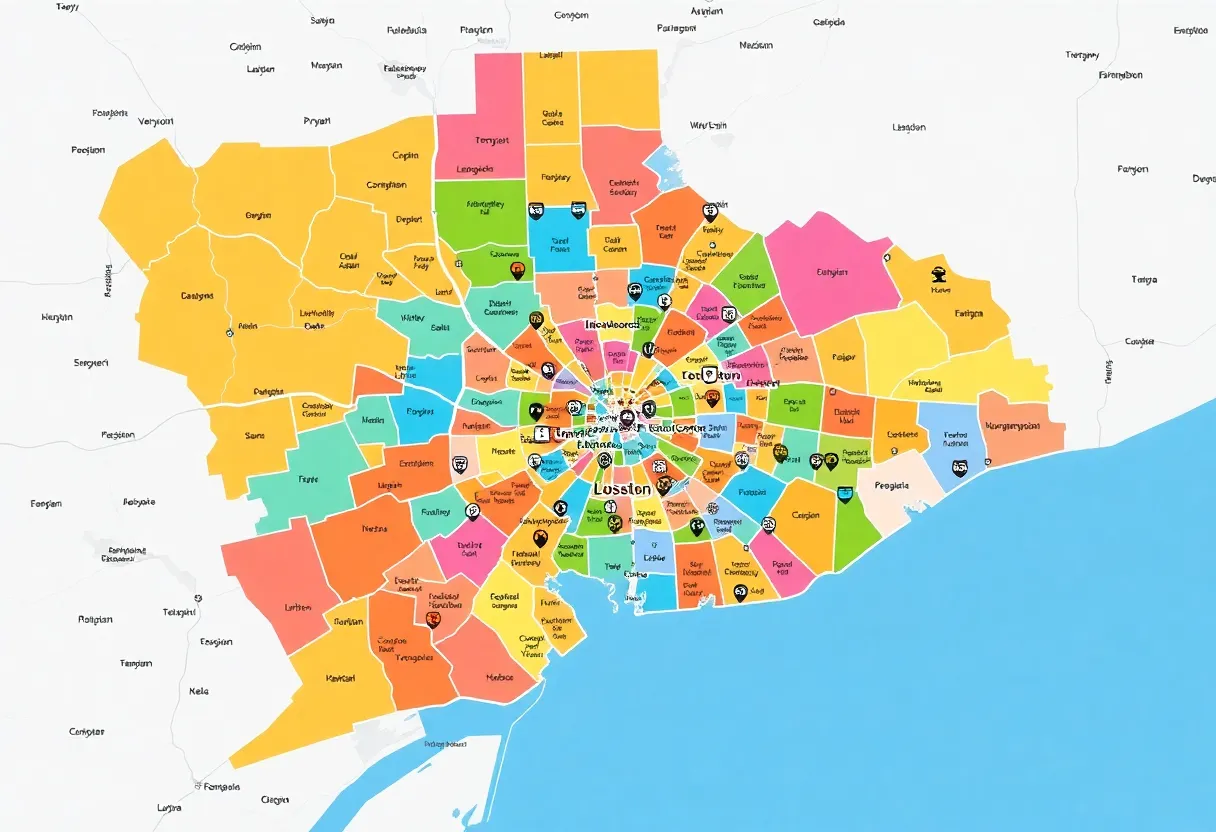News Summary
The recently unveiled congressional redistricting maps in Houston have sparked uproar over their potential negative impact on minority representation. Critics, including Democrats and minority leaders, argue the changes could dilute voting power in historically marginalized districts. Significant alterations affecting Districts 9, 18, and 29 have raised concerns about political maneuvering designed to benefit Republican interests. This political drama unfolds amidst pressing national attention and local recovery efforts, setting the stage for intense political competition in Texas.
Houston Proposed Redistricting Maps Ignite Controversy Over Minority Representation
Houston is facing a political maelstrom as newly proposed congressional redistricting maps were unveiled on Wednesday during Texas’s special legislative session. The maps aim to reshape congressional representation in a state notorious for its size and diversity, raising urgent concerns about their implications for minority representation.
The mid-decade redistricting, occurring just five years after the last revision post-2020 census, has stirred frustration among critics, particularly Democratic and minority leaders. They assert that this political maneuvering is designed to diminish the influence of minority populations in Congress. Public hearings held prior to the map release illuminated widespread dissatisfaction regarding the lack of transparency, with Democrats calling for clarity on the potential impacts of the proposed changes.
Key Changes and Impacted Districts
The proposed maps include significant alterations to several key districts, notably Districts 9, 18, and 29, which have historically served Black and Latino communities. Under the new plan, District 18, once held by the late Sylvester Turner, is now vacant and will be included in an upcoming special election, which could fundamentally alter competitive dynamics within the district.
One of the most substantial changes is the merging of Democratic Representatives Greg Casar and Lloyd Doggett into the same district, a decision likely to heighten political tensions. District 9 is also set to change in a way that analysts suggest could make it more GOP-leaning. Furthermore, residents in Houston’s East End risk being moved out of District 29, currently represented by U.S. Rep. Sylvia Garcia, complicating the representation for those communities.
Concerns Over Minority Voting Power
As the redistricting process unfolds, critics have raised flags regarding the dilution of minority voting power across these districts. Many are alarmed by allegations of “racial gerrymandering” in District 18, which the Department of Justice has previously flagged as potentially violating principles of fair representation.
Political analysts speculate that pressure from national Republican leaders, including former President Donald Trump, has influenced the push for additional Republican congressional seats in Texas. The proposed changes could enable Republicans to gain as many as five new seats in the forthcoming midterm elections, intensifying partisan competition.
Legislative Process and Timeline
The House Redistricting Committee Chair has defended the current process, arguing that holding hearings before drafting maps is standard protocol. Yet, the timeline for finalizing these redistricting plans is pressing; lawmakers have until August 19 to reach a consensus, and a public hearing to discuss the maps is scheduled for Friday.
This urgency comes at a challenging time for many Texas residents as they are still recovering from recent disasters, raising concerns about the appropriateness of prioritizing redistricting amid ongoing recovery efforts. The proposed changes in district boundaries will result in a significant shift in representation for millions of voters across Texas, leading to increased political tensions and possible backlash from affected communities.
Looking Ahead
National Democrats are poised to mobilize significant resources to combat Republican incumbents in Texas, citing issues of fairness and equitable representation. As the redistricting process continues, the ramifications of these proposed maps will not only shape the political landscape in Houston but also set the tone for statewide representation for years to come.
Houston’s citizens and lawmakers alike await further developments as the discussions unfold, convinced that the outcome of this redistricting could redefine the political identity of their communities.
Deeper Dive: News & Info About This Topic
HERE Resources
Public Outcry at Texas Redistricting Hearing in Houston
Texas Hemp Industry Faces Uncertain Future with Senate Bill 5
Texas Legislature Faces Deadline for Redistricting Debate
Tight Race for Texas’ 18th Congressional District Special Election
Governor Abbott’s Controversial Redistricting Plan Affects 18th Congressional District
Texas House Holds Hearings on Redistricting
Texas Lawmakers Prepare for Special Session on THC Regulation
Texas Lawmakers Begin Special Session on Redistricting
Additional Resources
- Houston Chronicle: Texas Redistricting Congressional Maps
- Google Search: Texas redistricting 2025
- ABC13: Texas Redistricting Hearings Spark Backlash
- Wikipedia: Gerrymandering
- El Paso Times: Texas House Hears Redistricting Concerns
- Encyclopedia Britannica: Redistricting
- The Leader News: Redistricting Firestorm Local Leaders Speak Out
- Google News: Texas redistricting 2025

Author: STAFF HERE HOUSTON TX WRITER
The HOUSTON STAFF WRITER represents the experienced team at HEREHouston.com, your go-to source for actionable local news and information in Houston, Harris County, and beyond. Specializing in "news you can use," we cover essential topics like product reviews for personal and business needs, local business directories, politics, real estate trends, neighborhood insights, and state news affecting the area—with deep expertise drawn from years of dedicated reporting and strong community input, including local press releases and business updates. We deliver top reporting on high-value events such as Houston Livestock Show and Rodeo, Art Car Parade, and Chevron Houston Marathon. Our coverage extends to key organizations like the Greater Houston Partnership and Houston Area Urban League, plus leading businesses in energy and healthcare that power the local economy such as ExxonMobil, Schlumberger, and Houston Methodist. As part of the broader HERE network, including HEREAustinTX.com, HERECollegeStation.com, HEREDallas.com, and HERESanAntonio.com, we provide comprehensive, credible insights into Texas's dynamic landscape.





